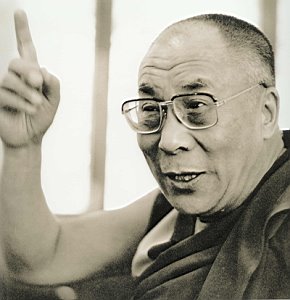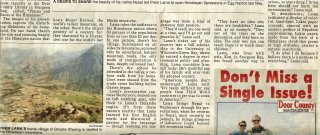It is telephonic conversation between a mother in Nepal and a son in USA, Enjoy it. Received via email in Nepal from my friend's mom. The story could be based on fiction. Also if you cannot understand some words, I tried to translate it on the bottom.
Subject: Fw: Excellent! That's what it is
Date: Tue, 23 May 2006 12:31:05 +0530
Love you baba we are all fine here.
Muwa: Hello?
JC: It's me.
Muwa: Janardhan?
JC: Yes.
Muwa: The line's very clear today. Where are you calling from?
JC: Where else? From home. What's going on there? You must be relieved it's all over now.
Muwa: That's what everyone says. I don't get it. How is it over? It's not like Gyanendra announced he found unlimited supply of water and electricity. Personally I would choose water over Girija any day.
JC: I mean the uncertainty is over. at least you can go outside now.
Muwa: Where can I go? I'm 61 years old. My husband spends his entire time talking senseless politics with his hopeless friends. My only daughter lives in Denver, my only son lives in Contikut. Go where? All my grandchildren live in Denver or Contikut.
JC: It's Connecticut.
Muwa: Whatever ticket. it's not Putali Sadak.
JC: If you're that bored in Nepal, why don't you come over here? How many invitations do you need?
Muwa: And do what there? Your son doesn't speak a word of Nepali. You work 12 hours a day. Banita is too formal with me. What will I do in Contikut? I can't even go out for a walk, it's cold even in Baisakh. Move to Myemi next to Puskar uncle, I'll come.
JC: No city pays MBA like New York. That's why I'm here. I don't get paid like this if I move to Miami.
Muwa: How's Banita doing?
JC: She's right here laughing, listening to you. We're on the speaker phone.
Banita: Darshan Muwa.
Muwa: Darshan. How are you doing?
Banita: Not bad.
Muwa: Is he treating you right? I worry more about you than my money-obsessed son.
Banita: He doesn't have time to treat me badly. How's buwa doing?
Muwa: Like any 'Kaangresi' here, he's ecstatic. It's easier to be happy, I guess, when you have a very short memory. He really believes it's a victory. I think his blood-pressure drug makes him hallucinate.
Banita: (laughs). Nishant! Nishant! Come here, say darshan to hajurmuwa.
Nishant (in the background): I don't feel like talking to Dad's mom.
Muwa: What's he saying?
JC: He's in a bad mood.
Muwa: How come your son is always in a bad mood? If his father devoted some time to him, perhaps, his mood will change. I've never heard of a seven-year-old who's so eternally in a bad mood. If you have no time for him, why don't you take him to a child sikatryst and fix him?
JC: Banita will teach him a lesson, he listens to her.
Muwa: He needs both parents.
JC: Ok. We'll talk about him later. So how did you pass time during the 'Aandolan'?
Muwa: I knitted a sweater for your father.
JC: Why would you knit a sweater in April?
Muwa: I had to do something. remind myself I was alive. Unlike your father, I'm too old and too wise to be animated by watching people protest.
JC: Buwa must be captivated by all this. He must spend all his time on the phone.
Muwa: That he does. But there's no one on the other end listening. Everyone's talking here. No one's listening.
JC: That's politics.
Muwa: That's lunacy. We listen to a parrot for god's sakes. Nobody listens to nobody here. Everyone is running like a mad man with a flag and an opinion. This is mental.
JC: But things look different from here. For the better.
Muwa: I know your CNN is telling you it's a hope. Just remember my words. in six months from today these selfish, greedy, shortsighted leaders will be at each other's throat.
JC: You have to understand, whoever they are, leaders are important for democracy.
Muwa: Exactly my point. But what we have here are not leaders. These are protesters. Girija, Madhav, or Gagan, or who not, these are all protesters. Nothing more. A leader should be a protester, a diplomat, a philosopher, an intellect, an orator, and a listener. These so called leaders here are limited to being protesters. These people can't govern, they can only march. And if one party starts governing, the other parties start marching. It's such a vicious cycle that depresses the heaven out of me.
JC: Obviously I have not thought this through as much as you have. But trust me I have lived in a free country, in the end freedom works. When people start focusing on their survival paycheck, the country tames itself out. That's what Nepal needs.
Muwa: Work where? Who's providing the work? You think we have infrastructure for anything? And don't give me that American democracy lecture. I too have read American history. White people who owned black slaves, revolting against another group of lazier white people, is not a revolution. It's an irony. If British white people had revolted to free black slaves from American white people, then that could have qualified as a revolution. Your Wall's Tree white executives have brainwashed you.
JC: For someone who knows so much, how come you can't pronounce a single name correctly? It's not Wall's Tree. It's Wall Street. When you visited Wall Street three years ago, did you see any tree growing out of a wall?
Muwa: I wouldn't know. They didn't teach me pronunciation in Kanya Mandir. I didn't go to St. Xavier's. Anyways, I want to be remembered for what I say, not how I say it. Accent is for people who have no content.
JC: Well said. Sometimes I wish you were born in this country. It's weird that you don't seem to be moved by all this that's taking place in Nepal. What happened to my radical mother of Padma Kanya Campus 2022 Bikram Sambat?
Muwa: She grew up to understand that hope too has an expiration date
JC: I remember you were so excited in 1990.
Muwa: I was only 45. I was naïve.
JC: Would you rather the king have it all?
Muwa: I'd rather, your uncle, who marched for democracy everyday, not kick his servant in the stomach for accidentally spilling his tea. I'd rather people knew what democracy is about, before chanting and marching for it.
JC: Baldev uncle is a lunatic.
Muwa: Not just your Baldev uncle, everyone here's a lunatic. Nobody gets it until they don't have it. When they have it, they don't know what to do with it. So they abuse it. And they are back to not having it. and they march and protest for not having it.
JC: You're talking about democracy or servants?
Muwa: You know what I'm talking about. For people here, democracy is about the freedom to be corrupt. And those who are not corrupt, like your buwa, they are gravely ineffective and incompetent.
JC: Muwa listen, I'm being sincere now. People are not as wise as you are. They need a system. People like you can operate on your own. Think about it, you operated in spite of buwa. He doesn't know how to boil water. He never made a cup of tea in his 66 years. People like buwa need something to cling on to, because they don't function from within. You are self-sufficient and you have this can-do attitude, these changes won't have impact on your life, but for someone like buwa, who seeks hope elsewhere, what happened recently is an achievement.
Muwa: Save that, in case BBC interviews you.
JC: Was it a little over the top? Banita is laughing here.
Muwa: Kidding aside, you're right. Your buwa worries me. Sometimes I worry what he will do if something happens to me. The man takes everything for granted.
JC: Buwa is such a happy-go-lucky guy; you have to give him that. I've never seen him stressed out about anything. You worry about everything.
Muwa: Because I think.
JC: Buwa also thinks. Maybe not important stuff. I'm darn sure he is worried about Girija's health.
Muwa: You know your buwa still suffers from constipation once in a while. Every time he's constipated badly, he looks at me as if I'm going to help him with that too. I don't know how, but I can see in his eyes, begging for help. I think he wants me to push for him, I suppose.
JC: (laughter). You and your buwa jokes. Banita laughed so hard, diet coke came out of her nose. I'm pretty sure he is not at home right now?
Muwa: He went for a morning walk. Hasn't been back yet. Must be somewhere sipping tea and talking politics.
JC: He's a netaa. That's what they do.
Muwa: I don't get it. Someone like your buwa is a netaa in this country. He doesn't understand how a family runs. I'll guarantee you he doesn't know where his shaving cream is. How can someone like him help the government run this country? Don't you need to have some kind of experience of running something? At least some experience of running your own life?
JC: Guess not. Does he still snore?
Muwa: You bet. When your mind is that empty, everything must clog up on your nasal passage.
JC: (laughter). Banita is rolling on the floor again.
Muwa: You have a good wife, keep her happy.
JC: Don't spoil her. We're on the speaker phone.
Muwa: How are your didi and the rest in Denver?
JC: Dijju and the kids are fine. I talked to them last night. Vinaju, like Buwa, is very excited about this Aandolan thing. He keeps on sending mass emails with his opinion. He really writes horrible. both in English and in substance, he's really bad. It's embarrassing.
Muwa: I hear he's pretty good in computer.
JC: He's a very good computer programmer.
Muwa: That's the problem with us Nepali. We just can't stick to what we are good at. Your vinaju is a technical person, not an intellect. I don't get it why he has to show his weakness to the whole world by having an opinion?
JC: I can't agree more.
Muwa: What else is new in Contikut? Connect-ticket? Whatever?
JC: It sucks here. You know my grass in the front yard isn't that good this year. I don't know what to do. I spent hours last October fertilizing it.
Muwa: You must be devastated. And people say Nepal has a crisis.
JC: Very funny. By the way, did you guys have enough food during the curfew?
Muwa: We had enough rice and potatoes. Some days we ate rice and potatoes, and other days we had potatoes and rice.
JC: Someone needs to retire that joke, even you couldn't make that funny. How are our neighbors? How is Abhay? Any improvement?
Muwa: I wasn't going to bring this up, since you did. Abhay got shot in the rally. He was in a serious condition, but they're saying now he will be fine.
JC: Abhay? Who took him to the rally? He's mentally retarded. What kind of mentally retarded person takes a mentally retarded person to a rally?
Muwa: Protesters wanted a big number. To cater BBC, CNN, and Times of India, I suppose. Your uncle took his daughter to the rally.
JC: She's eleven.
Muwa: How do you think we got the parliament? Are you not happy we have a parliament now? Everything will be ok now.
JC: Sarcasm won't solve our country's problems either, muwa. For an argument's sake, forget about Girija, Deuba, and the others. this Maoist thing, it doesn't bother you?
Muwa: I wake up every morning at 5:30. Most of the days, there's no water to begin my day. I clean the pooja room and do my pooja, sweep the bedroom and make our bed. By that time your father's guests start arriving. I make at least four rounds of tea every morning. I help Narahari cook and clean. By the time I get a chance to breathe, it's already 11. Then there are other dozens of chores with cleaning and gardening and laundry and what not. I'm still fighting with my diabetes and blood pressure. Then there are other headaches like five-hour long load shedding. Tell me what time of the day should I worry about the Maoists?
JC: You need a break. Come over.
Muwa: Fix your son, I'll come.
JC: Now you're being harsh.
Muwa: I heard him call me 'Dad's mom'. I can't pronounce like you, but I understand English.
JC: Trust me he will be punished. Banita wants to say something.
Banita: Muwa, I was praying that you didn't hear that. I'll make sure he gets punished.
Muwa: You guys are really naïve. How can you guys make him interested in us by punishing him? When I say fix him, I meant fix him by fixing yourself. Especially you, Janardhan. Pay attention to your kid, spend time with him, tell him about his family, your childhood, your parents, your sister, make him understand the concept of being a family. Fix your home first, there are enough people in the street to worry about Nepal.
JC: It's not like I'm not trying. My work is very demanding.
Muwa: No job on this planet is more important than being a good parent. Your buwa may have flaws, but he was a great father. When you were kids, you and your sister enjoyed every second of your time with him.
JC: I'm not that old not to remember that. You don't know how much dijju and I appreciate that. We were talking about that even last night.
Muwa: You do the same. Save time for your family. By the way, you seem to have developed a whole lot of interest in your country lately.
JC: Because it's everywhere, on TV, on the Internet. Everywhere. The entire world is watching Nepal. It's an important event.
Muwa: Trust me it's not important. What you did was important. Leaving this country was important. I was looking at the rally on TV the other day; it occurred to me, any person in that crowd, any one of them, if he is given a visa to America, he will leave this country in a heartbeat. Good ones and lucky ones have already left. What you saw on TV was the gathering of residues. Those who have not found a way to escape. I tell you, unless you want to mock us, don't be interested in us. We have become a zoo. Foreigners come, take our pictures, and run the headlines: "Look at these people, even they are trying." I'm telling you, do your thing. What you're doing is important. You are working. You are helping the economy.
JC: Now you're generalizing. I'm pretty sure there are many brilliant people left in Nepal.
Muwa: Of course there are many brilliant people stuck in Nepal. Most of them not by choice. The strangest thing is watching these intellectuals trying their best, so that you don't notice them feel sorry for themselves.
JC: I only have a minute left.
Muwa: I have many years left.
JC: I was talking about my phone card.
Muwa: I was talking about the time we will not spend talking to each other. Like now.
JC: C'mon don't make me feel guilty. You have this uncanny ability to make my every call a guilt trip. Send me your writings. Hopefully, Buwa has learned to scan the papers. One of these days, I'll convert your writings into English and have my colleagues and friends read it.
Muwa: Why?
JC: I think your creative skepticism is worth sharing.
Muwa: Don't do it.
JC: Why not?
Muwa: Because writing is as much about language. You lose the gist in translation. I read the Hindi version of the Hyaree Pautter. I didn't like it. I bet it was written for English speaking world.
JC: I should have bought that 30-minute card. I'll call you next week, same time. Tell Buwa to be at home.
Muwa: Are you all happy there?
JC: We have water.
Muwa: That's important.
JC: For grass it is.
Glossory: By me
Darshan=hello (formal) to elders
Muwa= Mom
Chhora=Son
Buwa=Dad
Bhinaju=Borther inlaw (elder sister's husband)
Dijju=Elder sister
Hyaree Pautter=Hairy Potter
Gyanendra = former king who rulled Nepal for over a 15 month
Girija= Newly elected Primeminister of Nepal
Kangressi=A political group known as congress.
Hajurmuwa=Granny
Bikram Sambat= Nepal era or Nepali clender












